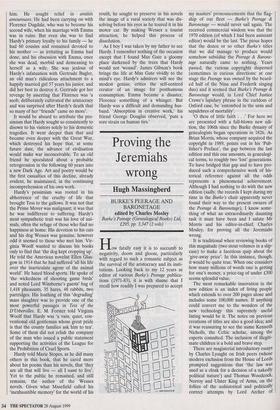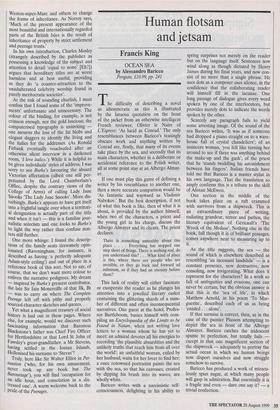Proving the Jeremiahs wrong
Hugh Massingberd
BURKE'S PEERAGE AND BARONETAGE edited by Charles Mosley Burke's Peerage (Genealogical Books) Ltd, £295, pp. 3,347 (2 vols) How fatally easy it is to succumb to negativity, doom and gloom, particularly with regard to such a romantic subject as the survival of the aristocracy and its insti- tutions. Looking back to my 12 years as editor of various Burke's Peerage publica- tions (1971-83), it is with shame that I recall how readily I was prepared to accept my masters' pronouncements that the flag- ship of our fleet — Burke's Peerage & Baronetage — would never sail again. The received commercial wisdom was that the 1970 edition (of which I had been assistant editor) would be the last. The pious hopes that the dozen or so other Burke's titles that we did manage to produce would somehow subsidise the Peerage & Barone- tage naturally came to nothing. Years passed, the various copyrights dispersed (sometimes in curious directions: at one stage the Peerage was owned by the beard- ed half of the Nina and Frederik singing duo) and it seemed that Burke's Peerage & Baronetage would, in Lord Chief Justice Crewe's lapidary phrase in the earldom of Oxford case, be 'entombed in the urns and sepulchres of mortality'.
`0 thou of little faith .' For here we are presented with a full-blown new edi- tion, the 106th since the Burke dynasty of genealogists began operations in 1826. As Brian Morris, whose company acquired the copyright in 1989, points out in his Pub- lisher's Preface', the gap between the last edition and this one amounts, in genealogi- cal terms, to roughly two 'lost' generations. To have bridged that gap and to have pro- duced such a comprehensive work of his- torical reference against all the odds represents a phenomenal achievement. Although I had nothing to do with the new edition (sadly, the records I kept during my time in the Burke's chair apparently never found their way to the present owners of the Peerage & Baronetage), I know some- thing of what an extraordinarily daunting task it must have been and I salute Mr Morris and his editor-in-chief, Charles Mosley, for proving all the Jeremiahs wrong.
It is traditional when reviewing books of this magnitude (two stout volumes in a slip- case) to make a facetious quip about the `give-away price'. In this instance, though, it would be quite true. When one considers how many millions of words one is getting for one's money, a price-tag of under £300 seems splendid value.
The most remarkable innovation in the new edition is an index of living people which extends to over 200 pages alone and includes some 100,000 names. If anything could convert me to the wonders of the new technology this supremely useful listing would be it. The notes on previous creations of titles are also a good idea; and it was reassuring to see the name Kenneth Nicholls, the Celtic scholar, among the experts consulted. The inclusion of illegiti- mate children is a bold and brave step.
There are magisterial introductory essays by Charles Lysaght on Irish peers (whose modern exclusion from the House of Lords prompted suggestions that 'the law was used as a cloak for a decision of a nakedly political nature') and Thomas Woodcock, Norroy and Ulster King of Arms, on the follies of the unhistorical and politically correct attempts by Lord Archer of Weston-super-Mare and others to change the forms of inheritance. As Norroy says, 'Much of the present appearance of the most beautiful and internationally regarded parts of the British Isles is the result of inheritance of property by strict settlement and peerage trusts.'
In his own introduction, Charles Mosley (strangely described by the publisher as possessing a knowledge of the subject and attention to detail 'equal to none' [Eh?]) argues that hereditary titles are at worst harmless and at best useful, providing as they do `a counter-attraction to the unadulterated celebrity worship found in purely meritocratic societies'.
At the risk of sounding churlish, I must Confess that I found some of the `improve- ments' unfortunate and unnecessary. The colour of the binding, for example, is not crimson enough, nor the gold luscious; the computerised typography is uninviting one mourns the loss of the fat blobs and elegant daggers to identify the living and the italics for the addresses. (As Ronald Firbank eventually vouchsafed after an otherwise silent interview in a darkened room, 'I love italics.') While it is helpful to be given individuals' styles of address, I was sorry to see Burke's favouring the absurd Victorian affectation (albeit one still per- petuated by the Lord Chamberlain's Office, despite the contrary views of the College of Arms) of calling Lady Jane Snooks 'The Lady Jane Snooks'. More dis- turbingly, Burke's appears to have got itself into a frightful tangle over when a territori- al designation is actually part of the title and when it isn't — this is a familiar jour- nalistic solecism and one looks to Burke's to light the way rather than confuse mat- ters still further.
One more whinge: I found the descrip- tions of the family seats tiresomely opin- ionated (Raveningham, for instance, is described as having 'a perfectly adequate Adam-style ceiling') and out of place in a reference book of this sort. Not to say, of course, that we don't want more colour to enliven the narrative pedigrees. My dream — inspired by Burke's greatest contributor, the late Sir lain Moncreiffe of that Ilk, Bt — was to carry on where The Complete Peerage left off with pithy and properly sourced character sketches and quotes.
Yet what a magnificent treasury of social history is laid out in these pages. Where else, for example, would we discover such fascinating information that Baroness Blackstone's father was Chief Fire Officer for Hertfordshire or that Lord St John of Fawsley's great-grandfather, a Mr Stevens, having settled in the Ionian Islands, Hellenised his surname to Stevas'?
Truly, here like Sir Walter Elliot in Per- suasion (`who, for his own amusement,
never took up any book but The Baronetage'), you will find 'occupation for an idle hour, and consolation in a dis- tressed one'. A warm welcome back to the Pride of the Peerages.



























































 Previous page
Previous page